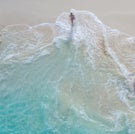“I was driving to the airport and the plane was just landing from its final test flight and it came right across the motorway,” recalls Sir Richard Branson.
“I remember swerving over all three lanes, getting so excited watching the plane but not watching where I was going.”
Forty years on from the maiden flight of an upstart airline named Virgin Atlantic, the bearded billionaire is describing his feelings on the day in June 1984 when the “legacy” transatlantic carriers discovered a challenger brand.
In the 1970s Richard Branson had created a music empire, signing talent such as Mike Oldfield, Phil Collins and the Sex Pistols. With a chain of music stores as well as a record label, the young entrepreneur spent a lot of time in the air. Which he really, really didn’t enjoy.
“The airline business was abysmally run,” he now says. Rather than just put up with uncomfortable seats and shoddy service, he decided to start his own airline – in an industry littered with expensive failures.
“I can’t say ‘no’ to a challenge. I just thought ‘screw it, let’s give it a go.’”
Since then, Sir Richard says: “Life has been a hell of a lot more fun.”
The fun started with the very first flight from London Gatwick to New York Newark on 22 June 1984. Having survived that motorway swerve as the Boeing 747 came into land, Sir Richard says: “We had one of those wonderful days almost equal to when I went into space.
“One of those wonderful, magical days where everything couldn’t have gone better.
“I remember on the first flight sitting with [partner, later wife] Joan and [their daughter] Holly on our laps and looking around the cabin and thinking: ‘We have the most delightful cabin crew in the world. They’re smiling, they’re joking, they’re happy.
“Will it last more than three or four years – will we last more than three or four years?”
Upon returning from New York to his then west London home at 80 Oxford Gardens, he says “I found the bank manager sitting on my doorstep”.
Even for a successful music mogul, taking on airline with the pedigree – and firm grip on the transatlantic market – of British Airways, Pan Am and TWA was a high-stakes game.
Two years earlier, Laker Airways had gone bust: forced out, according to Sir Freddie Laker, by the big boys ganging up. He advised then plain Mr Branson to…
Click Here to Read the Full Original Article at The Independent Travel…
